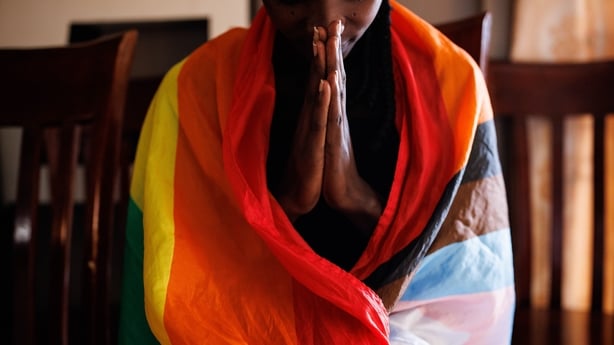The Ugandan government has passed an amended version of their anti-homosexual bill which originally called for a 20-year prison term for those who identify as LGBTQ.
While anti-gay rhetoric had been spreading across the country, many in the community did not think that the bill would pass. In fact, it seemed as though things had started improving for some.
LGBTQ refugee Sulah Mawejje had watched the initial parliamentary proceedings in disbelief.
"In my head is how did we get to this? To a point where they want to castrate someone or end someone's life just because they love differently," she said.
Sulah, who fled Uganda to Kenya, told RTÉ News that the feeling that he was seen as an "other" or "outcast" started young after being abandoned when his parents died.
"I had to move in with my uncle who is a very staunch Muslim. During this time, my cousin outed me to his dad. My uncle told me he couldn't shelter me, that I was a disgrace to my late father."
Alone, Sulah moved to Kampala, living in dingy accommodation, constantly worried about being identified as gay.
The amendments made on the recommendation of Ugandan President Yoweri Museveni now say that "a person who is presumed or suspected to be homosexual, who has not committed a sexual act with another person of the same, does not commit the crime of homosexuality".
Parliament maintained the law that "aggravated homosexuality" was still a capital offence.
Many in Uganda's LGBTQ community do not feel these changes offer enough protection.

They say that support organisations are facing more danger, not just from the general community, but by the incentives given to expose these groups.
"There is already a witch hunt by someone who calls himself an ex-gay. Who has been outing several organisations. This person has been handing out names of organisation," Sulah said.
Now organisations seen to promote homosexuality will receive a ten-year ban.
He added that organisations which were lifelines for queer people who had been thrown out of home or faced violence, were now shutting down, and that it would only lead to more deaths.
So far five African countries decriminalised same-sex relationships: Angola, Botswana, Mozambique, Lesotho and Seychelles.
However, elsewhere on the continent there seems to be an increase in homophobia with more countries adopting harder stances against the LGBTQ community.
Of the 64 countries across the world that criminalise homosexuality, over half of those are in Africa with Nigeria, Mauritiana, Somalia and South Sudan making it punishable by death.
When Sulah fled Uganda for Kenya, he had hoped for a more accepting environment where he could finally be free to be himself.
However, he arrived to find refugee camps being closed and had to camp outside the UN for a week before getting any help. "I was staying with my friend in Kawangware, then later we got into fights with the neighbours calling us "shogas" (derogatory name for gay people) which then I didn't know means gay people. I do now."
While Kenya has never decriminalised homosexuality, it was considered by many to be more accepting of the community, particularly in the capital.
However, like Uganda, there has been recent movement against the LGBTQ community, including a failed high court ruling that attempted to ban the gay community from registering organisations.
For many, the new bill will only put more people at risk, with neighbours pitted against each other.
Cleopatra is a trans woman living in Uganda and was the first trans woman to legally have her national ID changed to her new name and gender.
Speaking to RTÉ News, she said: "You see society and the number of people who are being programmed to think that people are bad because they are trans ... or that queerness is somehow the devil, really speaks of that air when we were told about people with HIV."
She added that the new rhetoric would only embolden hate towards gay men and in particular gay women.
"What we will end up seeing more, is just higher numbers of corrective rapes. That's the kind of conversation they want to have, 'let us show you how to fix you."
Cleopatra likened the new ruling to the different stages of grief. She said "First you are in denial. You ask, "are we really here?" Then anger, which is where I am."







